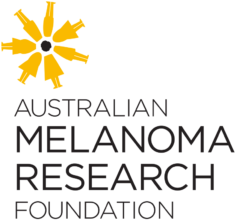I have an aggressive stage IV melanoma skin cancer which has metastasised to my lungs, bones, liver and lymph glands. I was facing my last Christmas with my young children in late 2013.
I have three children – 6, 12 and 14 years old.
In January 2012 I had a mole removed and was told I had ‘clear margins’. I had one follow up but was really not aware of my increased risk of further disease and what the follow-ups were looking for.
In February 2013 I discovered a lump under my right arm and was diagnosed with stage III melanoma. It was at this point my life turned upside down. I stopped working but I had hope that the surgery would remove all the cancer.
I had my lymph nodes removed and required a permanent medical draining device over the next 3 months. During this time I also recieved adjuvant radiotherapy, the burning of which added to the pain and swelling in my arm that I experienced post surgery (not uncommon for melanoma patients who have had lymph nodes removed from the underarm or groin) and have worn a compression sleeve every day since. My cousin and other friends drove me to my daily radiotherapy and to my appointments with the surgeon. Over those 3 months I entered a world I did not know existed. My vocabulary increased to include all the new words and phrases to describe my illness and treatment.
I suffered cellulitis and, as a result, became aware of the Lymphoedema Association of South Australia. This swelling and the effect of radiotherapy has impacted my arm function and as a result I attended a physiotherapist Lymphoedema & Laser Therapy fortnightly and now monthly.
In May 2013 I was told that the disease had spread further and was unresectable. I was stage IV, and while chemotherapy was an option, success rates were variable. I was ineligible for a clinical trial underway at that time due to my specific tumour gene expression. I was told that if chemotherapy did not work I would not have any more options.
I focussed on my health, green juicing, an alkaline diet, supplements, yoga and long walks every day with friends who formed a roster. I was probably the healthiest I had ever been.
I was beside myself, what do I tell the children, how do I deal with this? I could not stop crying when I thought about my children and the impact this could have on them. The staff at the Southern Adelaide Palliative Services were incredible, I was able to access counselling there where I could talk about issues I couldn’t discuss with anyone else. It was through this group that I discovered another one of my silver linings, the Daw House Complementary Care Centre where I received (and still do receive) support, understanding and spiritual strength.
Chemotherapy did not work and Yervoy was not yet available on PBS. I couldn’t accept this; I had three little boys to help grow up.
My doctors had said don’t look on the internet, but what do you do when you cannot sleep at 4am?
My searches unveiled the Melanoma Patients Australia Group and the support group operating at the time was incredible. I now carry on that legacy of support.
I researched online and found preliminary clinical trial results that looked promising. I called the pharmaceutical company MSD and found that I could enter a clinical trial at the Austin in Melbourne for the drug that is now called Keytruda. I live in Adelaide so involvement in this trial has required interstate travel every 2 weeks.
There were delays and more delays. I could feel tumours pop up around my ribs and on my collar bone and under my scalp. Sharp stabbing pains in my back and ribs made walking and sitting in certain positions very uncomfortable. I almost missed out on involvement in the trial due to the delays and my declining health.
A friend accompanied me to Melbourne for the ‘randomisation’. I was lucky enough to be placed in the group that was receiving the highest dose of the active drug, rather than the group receiving Yervoy (the standard treatment protocol which became available only in August of 2013). This wasa relief for me and my family given the financial and emotional investment they made for me to participate in the trial. Sue and I received the news whilst distracting ourselves in Melbourne central. We found a rooftop bar and ordered a glass each of bubbles – the first in 6 months! A month later I could feel the tumour on my collarbone shrink under my fingers.
The drug has worked and the result is magnificent. The first scan (three months after trial initiation) showed an incredible result. Since I started the trial 18 months ago, tumour shrinkage has been noted at all but two of my six-weekly scans (now 3 monthly). The trial is due to finish in October 2015. Although this drug has saved my life I am not clear of the disease. But my progression free survival has reached 18 months with no sign of abating.
If I had not been ‘pushy’ I would not have had access to this treatment. In my experience, patient experience varies largely depending on the treating hospital or doctor. For patients with advanced melanoma, time is not on their side, they need to be treated by an oncologist who is an expert in melanoma and is aware of and involved in trials for melanoma drugs.
Many fellow patients I have met on my journey have died because they were not as ‘lucky’ as I was: not lucky enough to have the ability to do their own research; not lucky enough to know when to move on to a new doctor; not lucky enough to be chosen in a random placement onto one of three arms in a trial; not lucky enough to have a family willing to make sacrifices to fly them to Melbourne fortnightly for treatment.
I have managed to return to work one day a week and am grateful for the support of my employer, Business SA, friends (who provide me with an ‘airport shuttle service’ as my flights and other transport costs are not covered by the trial) and colleagues. I have been lucky to also have a loving husband, three children and a magnificent mother who have supported me through this journey.
Because I have been luckier than most in my situation I have also taken on the role of SA facilitator for Melanoma Patients Australia: educating the public on risks of Australia’s national cancer; and supporting and being an advocate for other melanoma patients. We meet on the last Monday of every month at the Cancer Care Centre in Unley at 10.30am. My email is karen@vangorp.id.au, I am happy to speak to fellow melanoma sufferers and their carers either by email or phone and I encourage you to attend our get-togethers.
I have hope new treatments will see an end to this disease and that the Australian Government will expedite access to these drugs for all melanoma patients.



